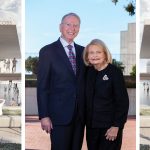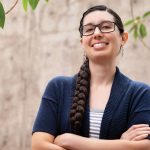Insights Natalie Luhtala Shaping pancreatic cancer research to have real world applications
This year, Staff Scientist Natalie Luhtala celebrates her 10-year work anniversary at the Institute. She came to Salk as a postdoctoral fellow in Professor Tony Hunter’s lab and now, in her current role, is directing a project examining an elusive signaling pathway to identify new targets for treating pancreatic cancer.
“I continue to learn and grow at Salk, as there are so many scientific leaders and creative minds to work with here,” says Luhtala. “I enjoy being able to collaborate on projects, which leads to more interesting data with clinical applications for the early detection and treatment of cancer.”
INSPIRATION
Luhtala wants to better shape scientific research to have real world applications. When she was an infant, she was diagnosed with hydrocephalus (fluid accumulation in the brain), which can be a sign of brain cancer. Fortunately, when she was 14, doctors discovered that her hydrocephalus was due to a harmless brain cyst and not brain cancer. Years later, she was reminded of the possible cancer diagnosis when a close family member was diagnosed with glioblastoma, an aggressive brain cancer, while she was diving into the field of cancer research in college. As a result, Luhtala devoted the first chapter of her postdoctoral research to glioblastoma. Now, she is investigating a previously uncharacterized signaling pathway in pancreatic cancer, another aggressive type of cancer. Her uncle recently passed away from pancreatic cancer, further solidifying her drive to work in the field.
“Cancer can affect anyone. There is always someone that you could be helping,” says Luhtala. “If you’re going to dedicate your life’s work to something, then it might as well be something that can help give people back time or their lives.”
RESEARCH INTERESTS
Luhtala came to Salk studying exosomes, spherical containers that carry and release biomolecules like fats, proteins and even DNA outside the cell. She was interested in seeing if exosomes communicated cell-to-cell using RAS signaling, which is a driver of cancer. She found that RAS signals primarily within the cell, but exosomes can provide information about a tumor’s origin and the types of signals (like RAS) that the tumor is using. This knowledge could advance the development of personalized treatments and diagnostics using exosomes found in biological fluids, such as cerebrospinal fluid, blood and urine.
Luhtala now studies histidine phosphorylation, a process through which a phosphate is added to a histidine amino acid. This process is important for sensing and responding to changes in the cellular environment and for cellular functioning, so she developed a novel way to detect histidine phosphorylation in mouse models of pancreatic cancer.
She is now collaborating with Postdoctoral Fellow Shixin Ma, in Susan Kaech’s lab, and Postdoctoral Fellow Nikki Lytle, in Geoffrey Wahl’s lab, to explore the role of the histidine phosphorylated enzyme ATP citrate lyase (ACLY) in immune cells in pancreatic tumors. Luhtala believes ACLY may aid certain immune cells in transforming into another type of immune cell, so she is investigating how ACLY behaves during cancer metastasis.
PATH TO SALK
Luhtala was studying RNA binding proteins’ contributions to cancer in the final year of her PhD in cancer biology at the University of Arizona when she saw Hunter speak at a seminar. “Tony is the king of cell signaling, and he has a strong interest in cancer,” says Luhtala. “After all, his discovery of tyrosine phosphorylation led to the leukemia therapy Gleevec! I knew I wanted to work with him right away.”
LEISURE TIME
Surfing and stand-up paddle boarding weren’t enough for Luhtala, so she took up stand-up paddle surfing. Now she enjoys scanning the ocean for sea turtles, leopard sharks and dolphins amongst the waves at La Jolla Shores. She’s also an avid mountain biker, and her favorite spot to ride is the Cannell Plunge in Kernville, California.
FUN FACTS
Luhtala is originally from Chicago, although her father is French, and she lived in Germany for a brief period of her childhood. She enjoys keeping up her French by conversing with the French researchers in the Hunter lab. She also has a soft spot for Boston terriers and has rescued many over the years. “I just love Bostons as they all have their own way of communicating,” says Luhtala. “Some snort while others whine—they’re just hilarious.”
LONG VIEW
Most patients diagnosed with pancreatic tumors eventually develop tumors in other parts of the body. Luhtala hopes her work on histidine phosphorylation and ACLY will lead to a better understanding of cancer metastasis as well as new therapeutic targets that will improve outcomes for patients with pancreatic cancer.
Support a legacy where cures begin.
Featured Stories
 Joan and Irwin Jacobs — A perfect matchJoan and Irwin Jacobs donate $100 million, a transformative gift, helping to launch Salk’s five-year, $500M philanthropic and scientific Campaign for the Future.
Joan and Irwin Jacobs — A perfect matchJoan and Irwin Jacobs donate $100 million, a transformative gift, helping to launch Salk’s five-year, $500M philanthropic and scientific Campaign for the Future. How computational biology is making us smarterThe Salk Institute is embracing the artificial intelligence revolution and inventing new ways to investigate life. Machine learning, deep learning and other AI techniques are being used to probe massive data sets, identify useful information and make accurate predictions.
How computational biology is making us smarterThe Salk Institute is embracing the artificial intelligence revolution and inventing new ways to investigate life. Machine learning, deep learning and other AI techniques are being used to probe massive data sets, identify useful information and make accurate predictions.  Dan Tierney – Biology Meets TechnologyDan Tierney is no stranger to big data. When Tierney founded a financial technology firm in the late 1990s, long before he joined the Salk Institute’s Board of Trustees, he was fascinated by emerging computational approaches that could crunch data and reveal hidden truths.
Dan Tierney – Biology Meets TechnologyDan Tierney is no stranger to big data. When Tierney founded a financial technology firm in the late 1990s, long before he joined the Salk Institute’s Board of Trustees, he was fascinated by emerging computational approaches that could crunch data and reveal hidden truths.
 Natalie Luhtala — Shaping pancreatic cancer research to have real world applicationsThis year, Staff Scientist Natalie Luhtala celebrates her 10-year work anniversary at the Institute. In her current role, she’s directing a project examining an elusive signaling pathway to identify new targets for treating pancreatic cancer.
Natalie Luhtala — Shaping pancreatic cancer research to have real world applicationsThis year, Staff Scientist Natalie Luhtala celebrates her 10-year work anniversary at the Institute. In her current role, she’s directing a project examining an elusive signaling pathway to identify new targets for treating pancreatic cancer. Laura Newman — From mitochondria to craft beer and backLaura Newman, a Salk postdoctoral researcher, fell in love with science in a lab in college and switched from a medical program to pursuing biochemistry and developmental biology. At Salk, her main focus is on how cells can recognize when they’re sick or damaged in order to activate the immune system for cell survival.
Laura Newman — From mitochondria to craft beer and backLaura Newman, a Salk postdoctoral researcher, fell in love with science in a lab in college and switched from a medical program to pursuing biochemistry and developmental biology. At Salk, her main focus is on how cells can recognize when they’re sick or damaged in order to activate the immune system for cell survival.





















































